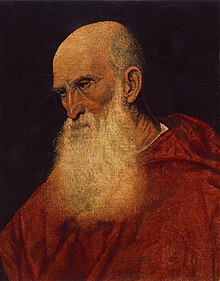Pietro Bembo
| Pietro Bembo, O.S.I.H. | |
|---|---|
 |
|
| Born |
20 May 1470 Venice, Republic of Venice |
| Died | 18 January 1547 (aged 76) Rome, Papal States |
| Occupation | Scholar, poet, literary theorist, Catholic cardinal |
Pietro Bembo, O.S.I.H. (20 May 1470 – either 11 January or 18 January, 1547) was an Italian scholar, poet, literary theorist, member of the Knights Hospitaller and a cardinal. He was an influential figure in the development of the Italian language, specifically Tuscan, as a literary medium, codifying the language for standard modern usage. His writings assisted in the 16th-century revival of interest in the works of Petrarch. Bembo's ideas were also decisive in the formation of the most important secular musical form of the 16th century, the madrigal.
Bembo was born in Venice to an aristocratic family. His father, Bernardo Bembo, cared deeply for the literature of the Italian people, erecting a monument to Dante in his hometown of Ravenna. The father also served as an ambassador for the Republic of Venice, and while still a boy Pietro accompanied him on many of his travels. One of the places he visited was Florence, there acquiring a love for the Tuscan form of Italian, a love which was to prove so important in literary and musical history. He studied Greek for two years under the Greek scholar Constantine Lascaris at Messina, and afterwards went to the University of Padua. Further travels included two years (1497–1499) spent at the Este court in Ferrara, under the reign of Ercole d'Este I, then a significant literary and musical center. While there he met Ariosto and commenced writing his first work, Gli Asolani, a dialogue on the subject of courtly love. The poems in this book were reminiscent of Boccaccio and Petrarch, and were widely set to music in the 16th century. Bembo himself preferred his poetry to be performed by a female singer accompanied by a lute, a wish which was granted to him when he met Isabella d'Este in 1505 and sent her a copy of his book.
...
Wikipedia
